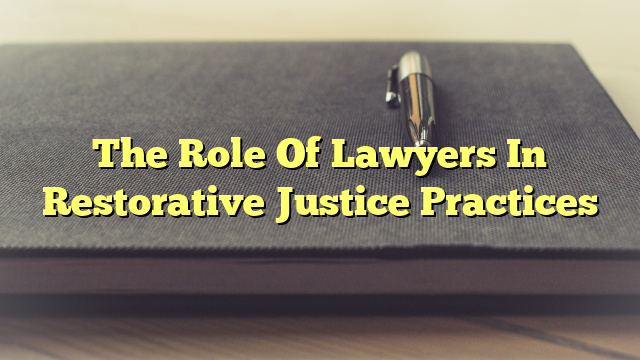The Role of Lawyers in Restorative Justice Practices
Table of Contents
- Introduction
- The Role of the Victim Advocate in Restorative Justice
- Who Controls Restorative Justice?
- Stakeholders Involved in Restorative Justice Practices
- Principles of Restorative Justice
- Role of the Lawyer in Restorative Justice Practices
- The Four R’s of Restorative Justice
- Conclusion
Introduction
Restorative justice is a form of justice that focuses on reparation and reconciliation between the victim and the offender. Restorative justice is based on four core principles: accountability, reparation, healing, and transformation. Restorative justice is an alternative to traditional justice systems, which focus on punishment for offenders. It is an approach that seeks to restore relationships between offenders and victims and to create a more just society.
The Role of the Victim Advocate in Restorative Justice
The role of the victim advocate in restorative justice is to ensure that the rights and needs of the victim are taken into account. Victim advocates support victims throughout the process and provide them with information, guidance, and support. Victim advocates also help victims understand their rights, advocate for their needs, and provide them with resources.
Who Controls Restorative Justice?
Restorative justice is controlled by the stakeholders involved, which include the victim, the offender, the community, and the justice system. These stakeholders work together to find a solution that is satisfactory to all parties, and that seeks to repair the harm done and restore relationships.
Stakeholders Involved in Restorative Justice Practices
The three main stakeholders involved in restorative justice practices are the victim, the offender, and the community. All of these stakeholders have an important role to play in the restorative justice process. The victim is the most important stakeholder, as the process is aimed at providing the victim with the opportunity to heal and receive reparation. The offender also plays an important role in restorative justice, as they must take responsibility for their actions and be willing to take part in the process. Finally, the community plays a role in providing support and resources to both the victim and the offender, as well as ensuring that justice is served.
Principles of Restorative Justice
The three main principles of restorative justice are accountability, reparation, and healing. Accountability is the process of taking responsibility for one’s actions and making amends for the harm done. Reparation is the process of making up for the harm done, whether through compensation or through an apology or other form of action. Healing is the process of addressing the underlying issues that led to the crime, and providing the victim with the opportunity to heal from the trauma of the crime.
Role of the Lawyer in Restorative Justice Practices
The role of the lawyer in restorative justice practices is to provide legal advice and assistance to the victims, offenders, and other stakeholders involved in the process. Lawyers can advise on the legal options available to victims and offenders, as well as provide information and guidance on the restorative justice process. Lawyers can also provide support to victims and offenders during the process, and help ensure that their rights are respected throughout the process.
The Four R’s of Restorative Justice
The four R’s of restorative justice are relationships, responsibility, reparation, and reintegration. Relationships are the foundation of restorative justice, and the process seeks to restore and strengthen relationships between victims and offenders. Responsibility is the process of taking ownership for one’s actions and recognizing the harm caused. Reparation is the process of making up for the harm done and providing the victim with the opportunity to heal. Reintegration is the process of helping offenders re


Lawyers are essential in restoring justice and maintaining the balance of fairness.